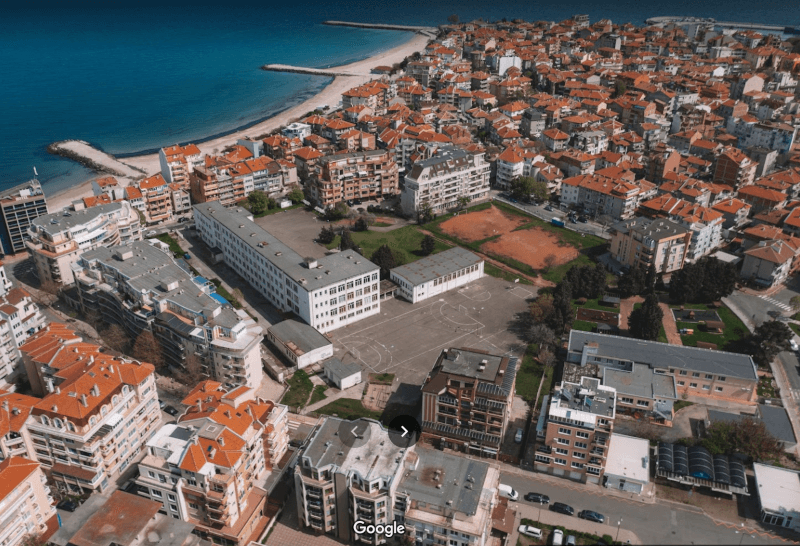
The schoolyard of Ivan Vazov School in Pomorie is open to the public. Both locals and guests are welcome to enjoy a recreational game of streetball, a stroll around the green spaces, or a moment of seated peace just meters from the beach in this historic Black Sea town, 20 km north of Burgas.
The school’s openness has its downsides, as Ms. Elena Koeva’s second-grade class found out last year. People sometimes drop their refuse in the middle of the yard; acts of vandalism are not uncommon either.
As participants in the Bulgarian Donors Forum’s Learning to Give program, Ms. Koeva and her class often discuss their surroundings and their own place in them as well as every person’s responsibility to look after community spaces. After spring break last year, however, the kids returned to school to find the latter wasn’t an idea everybody shared: the school grounds looked like a dump.
“Not only were the kids outraged, but they also decided to set an example for their parents by cleaning up themselves,” Ms. Koeva explains. “They also suggested that we put up signs that would appeal to people’s civic consciousness and would help re-educate both their parents and the rest of our fellow citizens.”
The eight-year-olds then set to work. They cleaned, drew, and researched traditional proverbs for relevant words of wisdom. In doing this, they donated their time and labor to make the schoolyard a better place for all. The signs they put up around the grounds were bright-colored and positive and politely reminded people to pick up after themselves.
“Please care for these spaces so children can play with smiling faces,” one of them read.
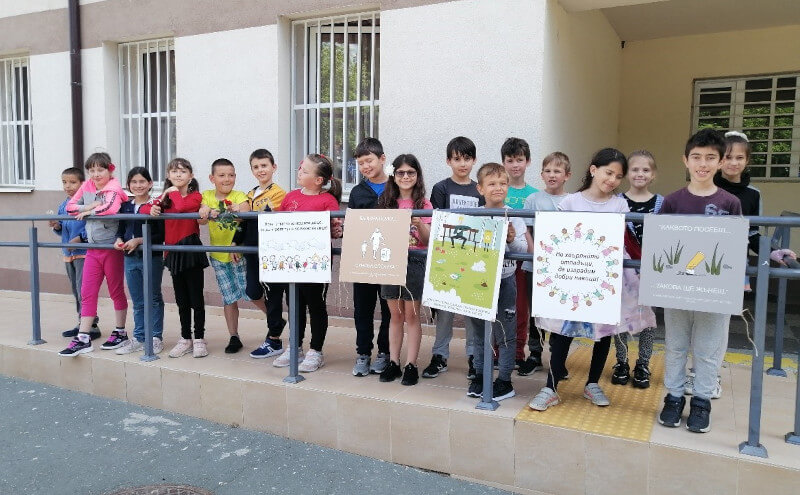
The rhymed appeal lasted a mere two days. The sign the kids had made with so much love and care lay broken, the pieces scattered all over the yard.
“The children were disappointed, but this provoked a discussion about whether we should give up in the face of failure or disapproval. We determined that, on the contrary, we would persist in our ideas and look for like-minded people to help us realize them,” Ms. Koeva says.
Crucially, the second graders did not even consider demanding restrictions to their school’s open access policy. Instead, they determined that they would keep using positive means to curb the destructively inclined. They have since remade the sign and continue tending to this shared space for the benefit of all its users.
This is the goal of philanthropy education programs such as Learning to Give. “Through these lessons, youth experience real-life situations and see their role in driving positive change,” says Boriana Kirilova, who manages the program for the Bulgarian Donors Forum, the country’s largest philanthropy association.
The Forum partners with teachers and school counselors to deliver Learning to Give lessons to school-age youth around Bulgaria. The program content is adapted to the students’ ages and social backgrounds, but dialog and practice are common to all Learning to Give activities. The discussions and hands-on projects students participate in through the program foster tolerance and inclusion in their communities, provide relief for victims of natural disasters, and improve community spaces, among others.
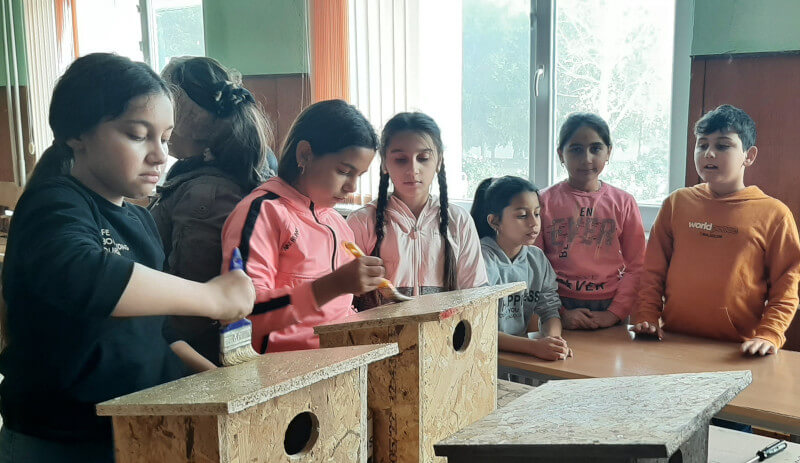
Ms. Kirilova is quick to point out that “these aren’t one-off campaigns, but a comprehensive system of knowledge and practices about giving, volunteering, civic engagement, and democratic values.” The system’s main goal is to “empower youth to take personal action for the common good,” according to the global Learning to Give website. Program activities in Bulgaria are spread throughout the school year and are planned around an international curriculum developed by Learning to Give, an endowed program of the US-based Council of Michigan Foundations, and adapted for Bulgarian classrooms by the Bulgarian Donors Forum.
In Bulgaria, the program was piloted in the 2016–2017 school year with the participation of 13 teachers, with more and more educators recognizing the program’s benefits over the years. Not only does program participation make students more empathetic and engaged, but it also helps them do better at school. And it isn’t just students who benefit; their parents and teachers are positively changed by the program as well. This year’s edition of Learning to Give featured 61 teachers, hundreds of students, and countless parents.
Ana Veleva, who teaches English to high school seniors at Ivan N. Denkoglu High School, Sofia’s 127th, is one of those 61 teachers. She instigated a public recognition ritual in one of her classes, which her students embraced enthusiastically. Every week, one student was bestowed the class crown for a special achievement, a kind deed, or generally supportive behavior. The honor recipient had to pass on the distinction to a deserving classmate the following week.
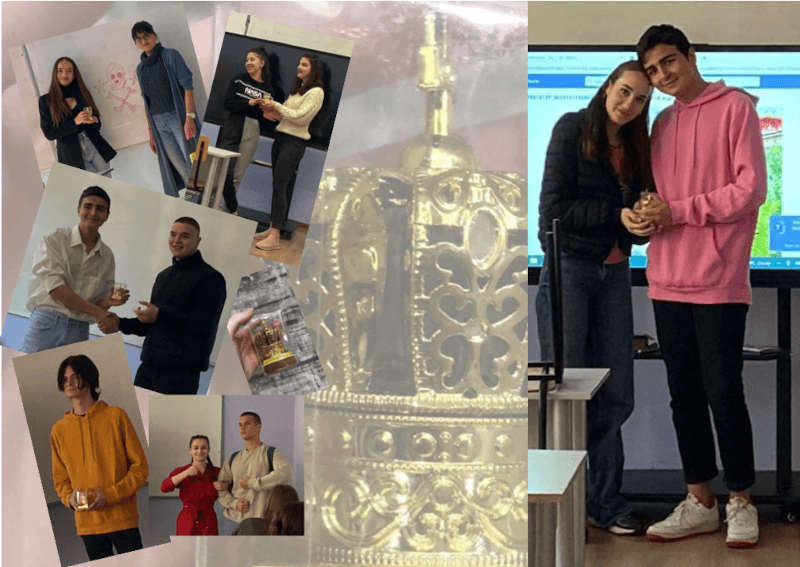
Although the crown was a cheap souvenir, the practice of publicly recognizing others’ merits has enormous value. “[It] aims to instill civic engagement and solidarity, which starts by developing conscious empathy, tolerance, gratitude, and recognition of people in our closest circle,” Ms. Veleva explains.
“Public recognition and applause are exciting and motivating for the recipient. What should not be underestimated, however, is the no less inspiring effect on the one expressing gratitude and learning to give recognition,” Ms. Veleva adds.
The program’s impact sometimes transcends a class’s immediate circle. Monika Ivanova’s seventh grade class from Nikola Parvanov Elementary & Middle School in the northern Bulgarian town of Lom became so enthusiastic about recycling that they rallied students from other classes, their parents, and even neighbors behind the cause. Funds raised from recycling drives in Lom have helped purchase medical equipment and supplies for the local hospital and pay medical bills for disadvantaged locals.
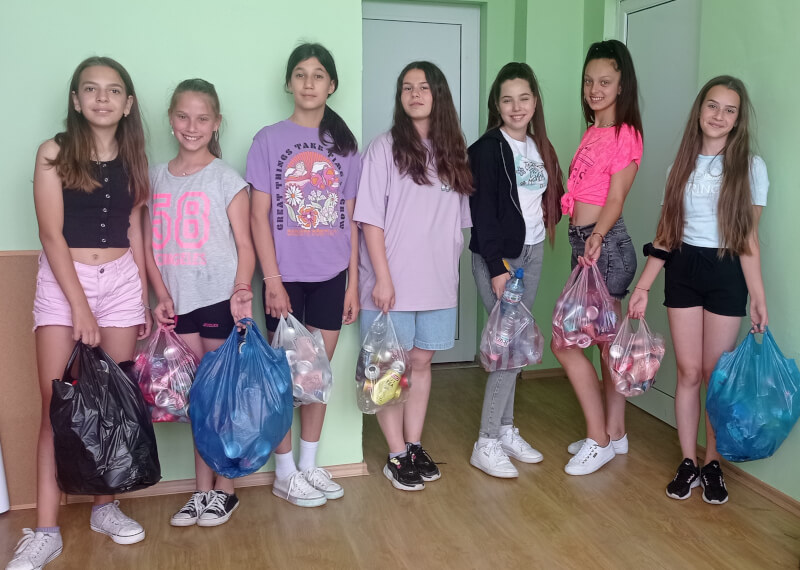
“Philanthropy isn’t just about giving money,” Ms. Kirilova sums up. It is about showing empathy for your community, and programs like Learning to Give are a structured way to cultivate such empathy.
We could all use a little more empathy in our lives. Or as the Pomorie second graders would put it, we could use more smiling faces.
So, let’s take care of our common spaces—and each other.
The Bulgarian Donors Forum (BDF) brings together philanthropic foundations and socially responsible companies supporting causes in the field of social services, ecology, cultural and historical heritage, education, human rights, and healthcare. The America for Bulgaria Foundation is a partner in the Forum’s mission to encourage responsible, sustainable giving among the country’s largest donors.

